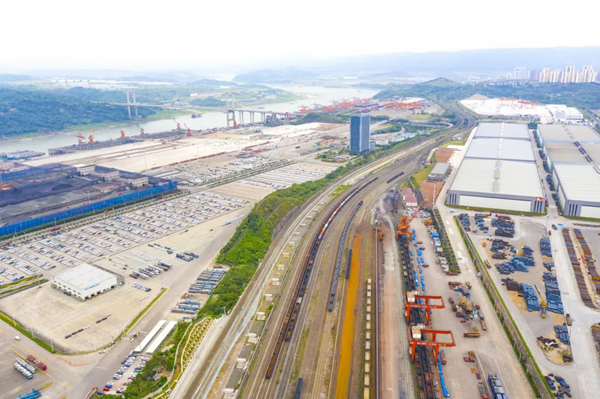New International Land-Sea Trade Corridor sees rapid growth from Jan-Oct

Guoyuan Port in Liangjiang New Area, Chongqing, is a crucial node of the Land-Sea Trade Corridor. [Photo/WeChat account of Liangjiang New Area]
The New International Land-Sea Trade Corridor has grown significantly over the past 10 months. During this period, 798 freight trains operated on this corridor, transporting 40,000 TEUs (twenty-foot equivalent units) of containers, with a total cargo value exceeding 7.6 billion yuan ($1.05 billion).
The corridor has now achieved regular operations at Guoyuan Port in Liangjiang New Area, Chongqing. Daily freight trains transport Chongqing-made products, such as auto parts and general machinery, to Qinzhou Port in Guangxi, where they are distributed globally.
Over the past two years, new international railway routes such as the China-Myanmar New Corridor (Chongqing-Lincang-Myanmar), the China-Vietnam (Chongqing Guoyuan Port-Hanoi), and the Yangtze River-South China Peninsula international intermodal route have been launched in Liangjiang.
"The comprehensive multimodal transport system and complete infrastructure at Guoyuan Port enhance the efficiency and reach of the trade corridor, linking China's western region with Southeast Asian and European markets," said a New International Land-Sea Trade Corridor Logistics and Operation Center representative.
Changan Automobile, made in Liangjiang, is rapidly integrating into Thailand's local market and increasing sales. Shen Xinghua, general manager of Changan Automobile's Southeast Asia Division, stated that it currently takes only one month to transport a new energy vehicle from Chongqing to Thai consumers via Guoyuan Port.
"With the future expansion of the trade corridor, this time can be reduced by about 10 days, allowing Chongqing-made new energy vehicles to reach global markets more conveniently," Shen added.
Over the past five years, the trade corridor has achieved regular operations for the automotive industry. It now offers customized, full-chain transportation solutions for provinces and cities along the route. Companies like Changan and Seres in Liangjiang have exported complete vehicles globally through rail-sea intermodal trains and the China-Laos Railway.



